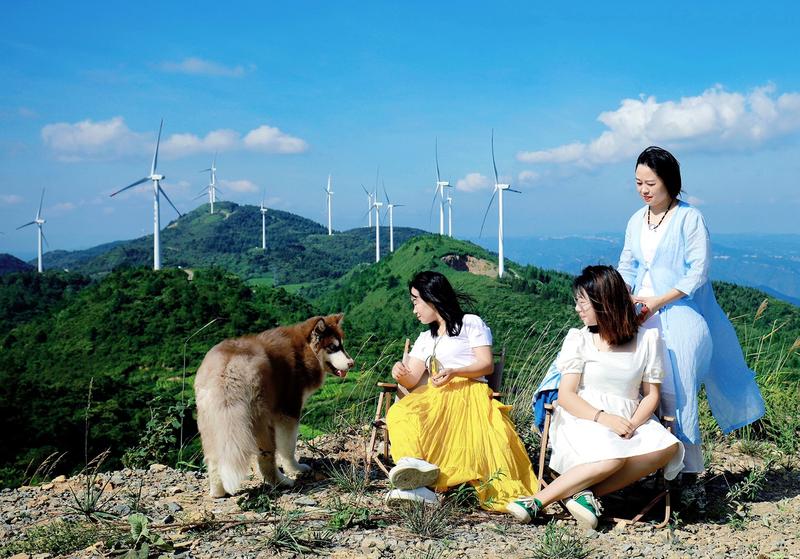Govt officials announce more commitment and contributions to climate governance
 Tourists visit a wind farm in Yunyang county, Chongqing, on Aug 17. (RAO GUOJUN / FOR CHINA DAILY)
Tourists visit a wind farm in Yunyang county, Chongqing, on Aug 17. (RAO GUOJUN / FOR CHINA DAILY)
China will build bigger platforms and provide more support to enterprises from all other countries to have exchanges and build cooperation in the green and low-carbon sectors in China, said government officials.
The move is part of the nation's broader efforts to honor its climate change commitments and make more contributions to world climate governance.
Xie Zhenhua, China's special representative on climate change affairs, said at a forum held on Saturday in Beijing that the nation has always been and will continue to be a key participator, contributor and pioneer in global climate governance, firmly implementing the 2015 Paris Agreement regardless if climate policy rollbacks take place in other countries.
"China's carbon goals are ambitious, but its actions are pragmatic," Xie said, adding that the nation has not only the resolve but is also taking concrete actions on promoting international cooperation in dealing with climate change.
Su Wei, deputy secretary-general of the National Development and Reform Commission, also said via video link at the same forum that China will proactively conduct green and low-carbon trade and investment cooperation with others and strengthen related technological exchanges to jointly tap third-party markets for win-win results.
The forum, a second edition following the first forum in 2021, was jointly held by the international cooperation center affiliated with the NDRC, the environment and economic policy research center under the Ministry of Ecology and Environment, and the Guanghua School of Management at Peking University. It aims to raise awareness of joint efforts to press ahead with climate actions.
"Together with others, China has been safeguarding international industrial and supply chain stability and resilience in green and low carbon sectors and sharing with the rest of the world its green and low-carbon development opportunities," Xie said.
"We hope other relevant countries will meet China halfway to build a supportive political environment based on peace and mutual trust and a fair, open and inclusive economic, trade and investment environment for global cooperation and multilateral actions on addressing climate change," he added.
China has signed documents with more than 50 countries and international organizations for cooperation on energy preservation, renewables, smart power grids, energy storage, carbon capture and utilization, green building, low carbon traffic and green financing among others, according to Xie.
Xie said that will boost innovation and transformation in relevant areas for coordinated development to strengthen actions and their effects on mitigating climate change.
Official data showed China's carbon emissions per unit of gross domestic product declined by 48.4 percent in 2020 from 2005 levels, exceeding its commitment of a cut of 40 percent to 45 percent. That was equivalent to a reduction of about 5.79 billion metric tons of carbon emissions.
Energy consumption per unit of GDP dropped by 42.6 percent from 2005 to 2020, with a cumulative reduction of 2.2 billion tons of standard coal consumption.
Non-fossil energy capacity in China hit 1.12 billion kilowatts by the end of 2021, and the nation has achieved average annual GDP growth of 6.5 percent from 2012 to 2021 with average energy consumption rising only 3 percent annually.
Su, with the NDRC, said mitigating climate change is a mission for every society and China will firmly follow a green and low-carbon growth pathway, make full efforts to realize its carbon goals and closely cooperate with the international community to act together and create a shared green future.
"Facing challenges, cooperation and development remain the expectations of people around the world," Su said.
"We must adhere to the principle of common and differentiated responsibilities and give play to our respective comparative advantages to strengthen global climate and environmental governance and jointly build a shared community of life on earth to benefit the people of the world and the future generations," he added.
James George, deputy resident representative of the United Nations Development Program in China, said global cooperation could bring down the costs of new energy technologies.
International cooperation is needed to address global issues such as climate change, knowledge and experience sharing, technology transfer and so on, he said.


